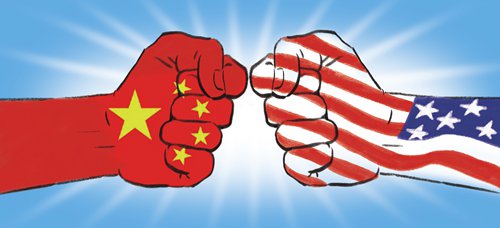Editor's Note:
The trade conflict between China and the US has escalated. What are the prospects of the trade war? What should China do to move forward? Chinese scholars exchanged their views on these issues at a forum hosted by The Charhar Institute and the publicity department of Zhangjiakou, Hebei Province, on Saturday.

Illustration: Liu Rui/Global Times
Lü Fengding, chairman of the International Advisory Board of The Charhar Institute
The trade war is a big problem in current China-US relations, and has also become a concern of the international community. It is not only a trade war, but also a conflict between protectionism and free trade, and a confrontation between the ideas of destroying and protecting the current international order. What's more disconcerting is that the trade war is likely to spill over into other areas and we have to be prepared for it.
Almost all trading powers in the world have been affected by the trade war, including Beijing and Washington.
It is the international community versus the US' unilateralism. Due to the trading powers' varied backgrounds, demands and pressure, we have to keep an eye on the complicated situation that is changing fast, and be able to resolve disputes and take countermeasures.
The US-initiated trade war is a part of Washington's containment strategy toward Beijing, and the damage to China shouldn't be underestimated. We have to cast away our illusions and be prepared for reasonable countermeasures and a protracted war, until the US gives up.
Hu Wei, international advisor with The Charhar Institute
Some Chinese scholars say that China has surpassed the US in comprehensive national power. US national power will, however, not decline immediately, not in a few years. The US will not always be the world's leader, but China's rise still faces hurdles and needs a long period of time.
The trade conflict may end up being either a positive-sum game, a negative-sum game or a zero-sum game. A zero-sum game or a positive-sum game both seem impossible.
The China-US trade war is very likely to be a negative-sum game. The trade war has become a lose-lose situation. Trump is a businessman and only wants to balance the trade deficit. He regards Russia as a rival, and has provoked almost every one of US allies. While China doesn't want to make a concession, Trump has shown a sign of returning to the mainstream - he may turn the trade war into a new Cold War, including finance war, resource war, geopolitical war and political war. China still has to be vigilant about the US' containment policy.
Yu Hongjun, chief research fellow with The Charhar Institute and former ambassador to Uzbekistan
The differences between China and the US span values, social system and global strategy. The US won't let other countries challenge its interests. Trump will provoke any country if he believes US interests are being harmed. Trump upholds his "America First" slogan and attacks the whole world. The trade conflict with China is only a part of the global trade war launched by the US and China is not the sole target of the US.
Beijing should be prepared for a protracted war. As the trade war escalates, China needs more wisdom and strategic focus. China also needs to recalibrate its relations with the US and the whole world.
The US is in a decline and losing international influence. However, we shouldn't oversimplify the situation. Washington will not fall immediately, and there is still a long way before China walks to the center stage.
Jia Qingguo, dean of the School of International Studies, Peking University
Although trade conflicts are inevitable, such a trade war is unusual. Trump upholds a trade view that prevailed during the 19th century, and most Americans don't agree with him. China has to take firm, moderate and precise countermeasures, trying not to expand the trade war into other areas. We have responded to Trump's sanctions on China, and we still need to be patient for a protracted war.
We also need to focus on the challenges behind the trade war, as they may damage China-US relations in the long run. The conflict will be resolved eventually, but the domestic political ecology will influence our relationship for a long time.
Although Washington is doing harm to Beijing as well as to itself, there aren't too many Americans questioning Trump's decision. Some Americans disagree with Trump because they believe it's unrealistic to achieve a trade balance in the 21st century, not because they want to protect China-US trade relations. This has come to be a big challenge.
Some Americans say that Washington should contain China, while others believe that the US shouldn't play a zero-sum game, and instead of being a threat, a democratic China will be the US' partner in protecting the global order.
Hong Yuan, research fellow at The Charhar Institute and a military expert
The phrase "trade dispute" isn't enough to describe the structural conflicts between China and the US. There has been a consensus in the US that a bipolar world will emerge where both China and the US will exercise leadership.
China's nation system is able to unite all the manpower, material, funds and ideology. Such a system gives Beijing an edge in the trade war, and the US will not accept it.
The trade war has extended from economy into industry, the service sector and finance. It is an all-round conflict between European and American civilization and Chinese civilization.
Trump wants to change China's political system and Chinese people's lifestyle and mode of production, including disrupting the "Made in China 2025" strategy. The US is worried about being marginalized by China. A war may be unavoidable.
The structural conflicts between the two countries are determined by the China-US bipolar system. The US should be aware that China will not pull punches to avoid the conflict.


